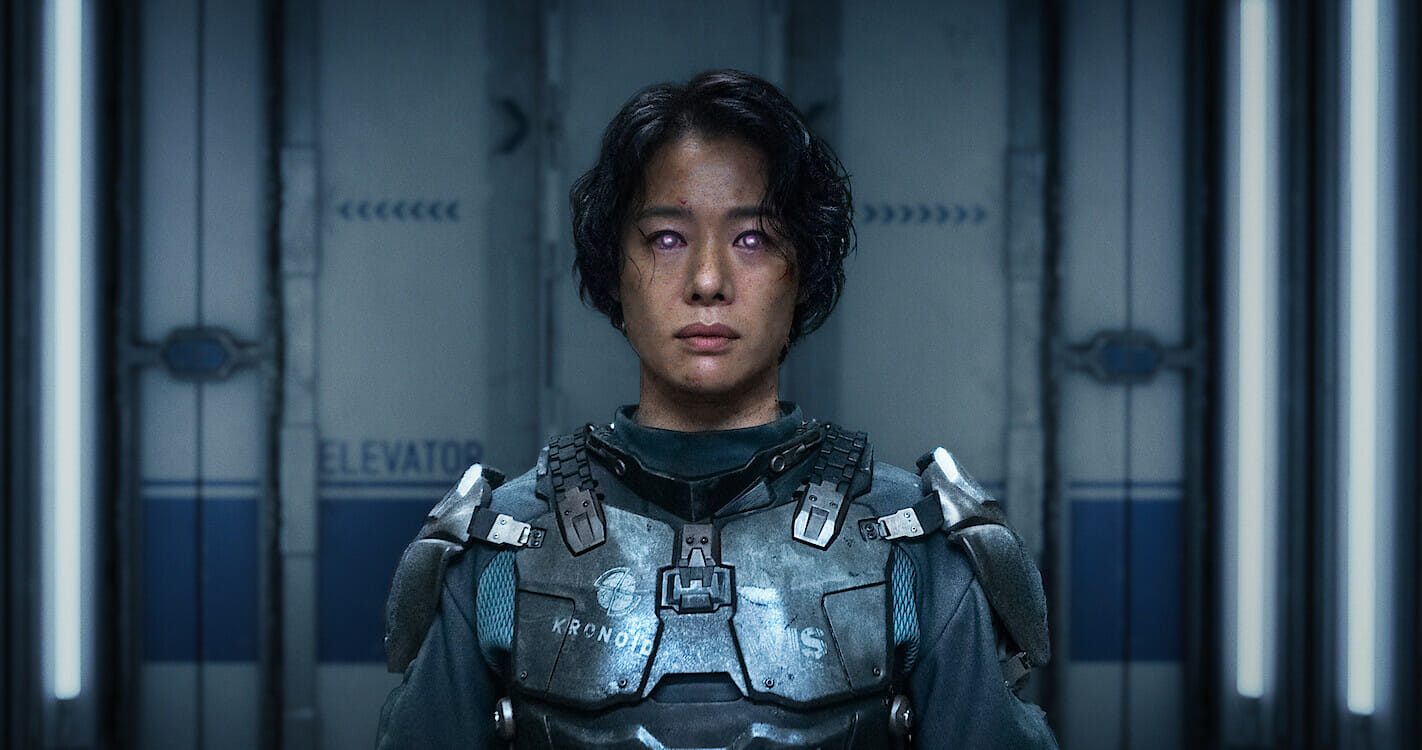Unlike pure fiction which runs almost synonymously with fantasy, sci-fi can find itself exploring the exaggerated versions of actual problems, including the nervous global-scale apprehension about climate change. There have been many popular sci-fi films using the premise over the years such as the Mad Max series, Waterworld, The Day After Tomorrow, Interstellar, and Snowpiercer to name a few. Netflix’s Jung_E, directed by Yeon Sang-ho, also falls under the same category, in which climate change makes for an effective backdrop to deliver a storyline about the ethics of cloning and AI.

Jung_E offers the idea of an almost totally exhausted Earth, forcing humans to build new colonies in space. Except for the advanced space-age technologies like AI and cloning, nothing much has changed in the fabric of society and humans’ tendency to engage in conflicts with each other. The privileged may live forever as their consciousness can be uploaded into robots, along with their human rights. The less fortunate will have to settle with only the chance to “preserve” their brain data for research. Everyone else at the bottom of the social hierarchy may save the data free of charge and put them for sale.
The amount of money you are willing to spend determines what happens to your brain after you die. The formula leads to an interesting take on the economic value of cloning and the production of AI robots. Nothing new is presented here. Jung_E’s attempt at scratching class warfare and apparent presentation on the intricacy of the parent-child relationship are also recycled ideas from director Song-ho’s own Train to Busan. Despite all the differences between the two films, any keen viewer can easily see the thread of similarities stretched throughout.
Jung_E opens with jaw-dropping action sequences with a mercenary Yun Jung-yi fighting a horde of combat robots. Before viewers feel like watching the prologue scene of a video game, the spectacle immediately transforms into a much more desperate display of the heroine laying comatose. She is immobile, and the fighting is only a simulation in a virtual space. The legendary mercenary of the Allied Forces, Captain Jung-yi, eventually suffered a loss and ended up in a coma but not before leading her squad to countless victories. The defeat happened on the day her little daughter, Yun Seo-hyun, underwent lung tumour surgery. In fact, Jung-yi became a mercenary so she could afford the medical bills to begin with.
Backed by a well-developed AI and cloning technology, the Allied Forces—now in a decades-long civil war against the Adrian Republic—plan to use Jung-yi’s brain data to win the armed conflict. They signed an agreement with her family to build an army of AI robots based on her mind and body. A series of clone versions are put through combat simulations as some sort of live-or-die training regime. To add to the complexities, her now grown-up daughter is leading the team of scientists working on the cloning program.
While the narrative opens with cutting-edge warfare, the story afterwards is mainly confined inside the research facility where the AI clone development takes place. All the characters and plot twists are revealed without blazing gunfire in the vast expanse of outer space to help grind the tension. There is also the long-played question about the characters’ true human nature, of whether they are AI robots or organic flesh and bones. For as long as the puzzle lingers on, the plot carves out a path to a blend of time-tested themes of freedom, morality, and identity.
Much of those are noticeably influenced by Blade Runner, including the ethics test that ends the aforementioned identity crisis. As far as classic sci-fi tropes are concerned, Jung_E taps and ticks the right boxes. But mixing them with a melodramatic story of a mother-daughter relationship doesn’t always work. Since the film’s true strength lies in the tale of parent and child connection, those classic tropes feel grossly under-explored or at least exposed only to a mere superficial level. Another major concern is over the villain, Kim Sang-hoon, the director of the cloning lab. The film explains his rather odd behavior in the most understandable way possible, but he is almost always over-the-top cringeworthy, if not too difficult to bear.
The ending involves a big battle scene between a robot clone of Jung-yi against the director, which turns out to be an android. Jung-yi and the AI attempt to escape the facility together although only the latter survives the battle. The daughter feels guilty for putting her mother’s brain into endless combat simulations and tells the clone to flee the facility alone. It is not exactly predictable, but not unexpected either. Outside the lab, the war still rages on.
We think Jung_E is an effective shot of adrenaline rush that time flies by all the way to the final credit. It offers a memorable world-building, which unfortunately has to take a step back and give way to a family drama. The action scenes are interspersed rather sporadically probably because they are never the core parts of the storytelling. Jung_E, with its fantastic start and slightly thought-provoking conclusion, almost feels like the first episode of a TV series instead of a stand-alone project. It is an outright entertaining spectacle to help anyone unwind.
Have you watched Jung_E? Do you think the film adds something new to the AI conversation? We’d love to hear from you.
Other things you might want to know.
Other than Jung_E, what other movies are directed by Yeon Sang-ho?
- The King of Pigs (2011)
- The Fake (2013)
- Train to Busan (2016)
- Seoul Station (2016)
- Psychokinesis (2018)
- Princess Aya (2019)
- Peninsula (2020)
- The Cursed: Dead Man’s Prey (2021)
Where to watch Jung_E?
The film is currently streaming on Netflix.
Who are the main characters?
Much of the storyline is told from the perspectives of three characters:
- Yun Jung-yi, the titular character and a war hero to the Allied Forces. Captain Jung-yi was critically injured during her last mission and is now in a coma. The government plans to use her brain data to build AI robots.
- Yun Seo-hyun, the leader of a team of researchers responsible for building the robots and testing their combat abilities via simulation. She also is Jung-yi’s daughter.
- Kim Sang-hoon, the director of the research facility.
Check out other articles by month:







